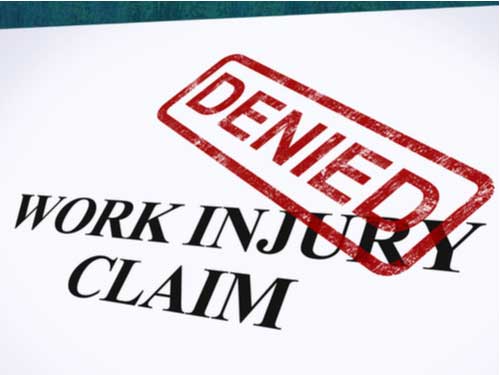When you get injured on your job, it can be an inconvenient and devastating situation. The pain, the shock, and the constant battles with the employer over whose fault it was could be overwhelming, not to mention the endless visits to the doctor and the bills that always seem to keep racking up. If you have been hurt while on the job, you shouldn’t let it stress you. Contact a Monroe workers’ compensation lawyer today.
North Carolina workers’ compensation laws have their own detailed specifics, and the team at Waple & Houk, PLLC LLC is well versed with the intricate details of the law. Whether you were recently injured on the job or your worker’s compensation case has become complicated, such as if you have been denied your claim for one reason or another, our team can help you navigate the situation.
Call our office near Monroe, NC at (704)954-8697 for a free case review.
What Is Workers’ Compensation?
Workers’ compensation is a legal system in which when an employee is hurt on their job, they are entitled to these benefits:
• Medical treatment, prescription drugs, hospital stays, etc. all of which are paid for by the employer’s insurance company
• Physical therapy and rehabilitation
• Temporary total disability benefits in case your doctor takes you out of work
• The necessary travel expenses
• You might be entitled to vocational rehabilitation
The workers’ compensation system is run by the state and gets funded through mandatory contributions from qualifying employers.
What Should I Do if I’m Hurt on the Job?
Here are some crucial steps to take after a workplace injury in Monroe, North Carolina:
Let Your Employer Know You Are Hurt
Ensure that you report your accident to your employer or your supervisor as soon as possible, ideally in writing. Informing your colleague just won’t suffice. don’t forget that waiting for more than a month to report the injury might make it more difficult to receive full benefits.
Get to a Doctor as Soon as You Can and Follow Your Doctor’s Instructions
Make an appointment with one of the doctors approved by your employer as soon as possible following the accident. In case you need to go to the doctor on the weekend or evening hours, first go to the nearest hospital. Either way, your employer will pay for the emergency care. Ensure that you follow all the guidance and instructions provided by the medical professional, follow all of the provided restrictions, attend all of the appointments, and take the prescribed medications.
Start and Keep a Written Record of Your Injury and Symptoms
It’s wise to keep a detailed journal of the accident. Make notes of your injury and symptoms as soon as possible after the accident. In your notes, be sure to include the names of any witnesses present at the scene and the dates. This will go a long way in helping keep your side of the story true and coherent.
Take Photos of Your Injury, if Visible
Based on the kind of accident, you should ideally take photos and/or videos of the scene of the accident and the resulting injuries. This will serve as evidence to support your claim and help you get the compensation you need and deserve. Keep in mind that your employer might not agree that you got hurt while at work, and such evidence will be essential.
File a Workers’ Compensation Claim With Help From a Lawyer
If you do believe that you have a case, you should contact an attorney who has handled cases similar to yours as soon as possible. A lawyer will help you file a workers’ compensation claim properly, while providing you with the guidance and advice needed to ensure your claim is successful.
What Are the Most Common Workplace Accident Injuries?
Some injuries that happen in workplaces tend to be more common than others. This is especially true for workplaces that require lots of physical labor, as they tend to see more injuries compared to others. Some tasks usually require lifting heavy or bulky objects, which subjects their bodies to great strain more frequently. Some of the common workplace injuries include:
• Back/neck injuries
• Burns
• Fractures
• Amputations
• Hearing loss
• Joint pain
• Slip and fall
• Construction accidents
• Accidents while traveling for business
• Accidents while working with machinery or tools
There are certain injuries that could cause a person to miss work for many months or years. Some might be mild and you will be back to work in no time.
Why Should I Hire a Monroe Workers’ Compensation Lawyer?
As mentioned earlier, the workers’ compensation system is designed to help an injured employee get back on their feet after an accident in the workplace. The system is designed to help relieve some of the financial troubles that the injuries could cause. However, just because you might be entitled to compensation, it doesn’t mean that getting the money will be easy.
Many employers and their insurance companies will often take advantage of the system to protect their interests and avoid paying the injured workers. As you file your claim, you will be required to adhere to some strict procedure and meet certain deadlines. Your employer might even conspire with their insurer rto put barriers between you and the amount of workers’ compensation benefits you are entitled to. Moreover, it’s easy to make simple mistakes that could cost you a significant amount of your compensation.
These reasons make a strong case for why you should hire an experienced workers’ compensation lawyer and work with them from the start. While filing some claims is rather straightforward, others are simply the opposite. Here are some of the things that could go wrong when making a claim:
• Your employer and their insurer might decide to deny you coverage
• Your employer could raise a dispute over what actually caused your injuries
• Your employer may force you to go back to work before you’ve fully recovered
• There could be a dispute over whether you were truly engaging in activities within the duties of your job at the time of the accident
If this happens to your case or it just seems to get complex, your best bet is to consult with an experienced workers’ compensation lawyer who can provide you with the guidance and advice you need.
At Waple & Houk, PLLC LLC, we will make sure that you have filed all the necessary forms and paperwork in a timely manner. We will also help you gather as much evidence as is available, interview witnesses on your behalf, negotiate with the insurance company, and work to ensure that you get the maximum workers’ compensation benefits.
How Much Does It Cost to Hire a Monroe Workers’ Compensation Lawyer?
In workers’ compensation cases (and other personal injury cases), there’s this unique concept of “contingency.” What it means is that clients of these kinds of cases are not required to pay anything to the lawyers unless they win the case on your behalf. In addition, the funds to pay for the legal services will be taken from the compensation award.
We also work under the contingency fee arrangement, meaning we won’t take any money from you until we win the case in court. We will then take a small percentage from the compensation we get you. This arrangement works for most clients since you can be sure that the lawyer will have your best interests at heart.
Keep in mind that the Industrial Commission doesn’t allow more than 25% fee to be charged in virtually all of the cases. This means that no matter your budget, you can hire the best possible lawyer to help you with your workers’ compensation claim. In fact, it’s in your best interest to focus on hiring a lawyer based on their experience and qualifications other than the fees they charge.
What Should I Do if My Workers’ Compensation Claim Is Denied?
In case your workers’ compensation claim was denied, you can seek a clear reason for the denial, and even file for an appeal. Having your claim denied doesn’t mean that you will no longer be able to recoup your workers’ compensation benefits.
When your claim is denied, you have the right to dispute it. The denial letter you receive should give you a good explanation about your workers’ compensation insurance coverage, how and when you can appeal their decision to deny your claim, and a notification of the deadline of filing your appeal.
If you choose to file an appeal, the first thing you need to do is to request a hearing with the Industrial Commission immediately upon the receipt of the employer’s denial letter. This is typically done by filing an NCIC Form 33.
Once you request a hearing, if you have legal representation, your case will be scheduled for a mediation session. In case your workers’ compensation case fails to settle at mediation, it will proceed to a hearing. The hearing usually takes place in front of a Deputy Commissioner with the North Carolina Industrial Commission (NCIC).
The hearing process will involve testimony, dispositions, and legal briefings. Having a workers’ comp lawyer represent you at these formal hearings will help you avoid walking in alone without the knowledge and the documentation necessary to ensure you receive your workers’ comp benefits.
If your employer and/or their insurance company is denying your claim, giving you the runaround, or simply don’t seem bothered about your case, you will be well served by seeking legal help from a Monroe, NC workers’ comp lawyer.
What Responsibility Does the Employee Have in Filing a Workers’ Comp Claim?
Every employer that regularly employs 3 or more employees in NC is required to obtain workers’ compensation insurance as per the North Carolina Workers’ Compensation Act. Otherwise, they qualify as self-insured for providing workers’ compensation benefits to their employees.
This act provides every person working in these eligible firms in the state with coverage for any workplace-related injuries, even when such injuries happen on the first day at the workplace. However, in order to be eligible for these benefits, the employee needs to abide by the following responsibilities:
• Abide by all of the written safety rules along with other reasonable procedures and policies as instructed by the employer
• Report any workplace injuries or accidents immediately to the employer or a representative of the employer (foreman, supervisor, etc.), ideally not later than 30 days after the accident
• Demonstrate beyond a reasonable doubt that the accident wasn’t a direct result of the willful misconduct of the employee
• Follow reasonable medical treatment and rehabilitation as requested by the NCIC
• Attempt jobs approved by your treating doctor, even then the pay grade is lower than the current role before the incident
• Inform the employer’s insurance company as soon as you move to a new location, and when you are ready to return to part-time or full-time work
• Inform your employer or their insurer when you change your address or remarry (in case of a deceased worker)
• Take a drug test following the workplace injury when requested to and provide justifiable evidence in case of refusal
• File your claim within one year in cases involving the death of a loved one in a workplace-related accident
• Be honest when filing your claim or risk being guilty of a misdemeanor for making false or misleading statements to claim benefits
What Responsibility Does the Employer Have in the Workers’ Compensation Process?
As long as an injury was suffered in the workplace, the employer is held responsible for the medical costs. This includes the out-of-pocket expenses and other payments that you may face in the future as a result of the injuries. You should ideally even be compensated for the lost income due to time spent away from work. However, as you file a claim, you should know that different issues may arise between you and your employer.
Aside from being responsible for providing you with workers’ compensation coverage, your employer is obligated to also be responsible for the following:
• Give out notices of compliance with the laws regarding workers compensation conspicuously
• Fill in and submit an accident or injury report to the nearest NCIC office and submit a copy to the insurer
• Provide further medical attention in case an injured worker is unable to select a suitable doctor or in case the employee request the employer in writing not to do so
• Comply with any requests seeking further information about the affected employees by the insurer or the NCIC.
• Provide all employees with immediate emergency medical treatment for injuries suffered while at work
• Make written reports for each accident that results in personal injury, require more medical attention than first aid, or causes loss of time from duties beyond the normal working hours.
Can I Be Fired for Claiming a Workers’ Comp Claim?
The short answer is no – at least not legally. Some laws are put in place to protect employees from this very behavior. If you believe that you have been wrongfully terminated, it’s important that you work with experienced counsel to help you prove that you were a victim of illegal retaliation from your employer.
Is there a Time Limit to File a Workers’ Comp Claim in Monroe, NC?
According to North Carolina law, the statute of limitations for workers’ compensation is two years from the date of the injury. In other words, this is the deadline for you to file your claim.
Can I Sue My Employer?
For most workplace injuries in North Carolina, you cannot sue your employer. The compensation offered by the employer’s insurance provider usually covers the benefits for your injuries. However, there are certain circumstances when you may qualify to sue your employer.
For instance, you may sue your employer if their egregious or intentional actions or inactions caused your injuries. You’ll require the help of an experienced Monroe workers’ compensation lawyer to prove your case.
Can an Independent Contractor File a Workers’ Comp Claim?
Independent contractors usually don’t have coverage for workers’ compensation, which makes it easy for certain employers to avoid paying their income benefits by classifying their employees as independent contractors. Keep in mind that even if you’re an independent contractor, there are certain situations where you might be eligible for these benefits.
What is My North Carolina Workers’ Compensation Claim Worth?
How much your claim is worth will be determined by the damages suffered in the workplace injury. The total worth will account for the following:
• Your medical bills (when treated by authorized health practitioners)
• Prescription medication
• Rehabilitation costs
• A percentage of your lost wages from time spent away from work
• All of the necessary travel expenses that are related to treating your injuries
• The income loss replacement benefit. This is usually two-thirds of the average weekly wage (but is capped at $575 a week)
• Permanent Partial Disability (PPD) – this is an extra sum of money awarded when the authorized treating physician gives you a disability rating based on the American Medical Association Guidelines
Get in Touch With a Monroe Workers’ Compensation Lawyer Today
Call Waple & Houk, PLLC LLC at (704)954-8697 to schedule a free consultation with one of our top Monroe workers’ compensation lawyers. We will assess the details of your case and help you navigate the entire claims process.
We can also help you discover potential avenues for pursuing compensation based on your situation and help you to get the workers’ compensation benefits you need and deserve.
Frequently Asked Questions for Our Monroe, North Carolina Workers’ Compensation Attorneys
What is the North Carolina Industrial Commission?
The North Carolina Industrial Commission is an agency of the State of North Carolina created by the General Assembly in 1929 to administer the North Carolina Workers’ Compensation Act. The goal of the Commission is to provide reliable, accurate, and efficient workers’ compensation claims servicing, quick resolutions to disputed issues in an administrative forum, review the status of insurance coverage for employers subject to the Workers’ Compensation Act, promote active resolutions of disputes through mediation, and resolve controversies by rendering impartial and well-reasoned decisions.
Are My North Carolina Workers’ Compensation Benefits Taxable?
Benefits you receive under the North Carolina Workers’ Compensation Act are not taxable. This means you do not have to pay federal and state taxes, including Social Security and Medicare taxes, on workers’ compensation benefits.
Who Gets to Choose Which Doctor I Go to After Suffering a North Carolina Work Injury?
Initially, your North Carolina employer will provide a list of approved medical service providers for you to seek care from after you have suffered a workplace injury. In most cases, you must abide by the approved list of physicians when seeking care. In extenuating circumstances, you do have the right to seek a second opinion from a third party but should speak with a skilled Monroe workers’ compensation lawyer first, to ensure you are not violating the policy and jeopardizing your case.
Are My Medical Bills Paid For Even If the Insurance Company Denies My North Carolina Workers’ Compensation Claim?
If your North Carolina workers’ compensation claim is denied by your employer’s insurance carrier, you will be liable for all expenses associated with your injuries. This is why it is so important to speak with an experienced Monroe workers’ compensation attorney to help ensure your rights and your claim are protected, so you are not left paying for your injuries out of pocket.
Are Remote Workers Eligible for Workers’ Compensation Benefits in North Carolina?
In many cases, a work-related injury that happens when an employee is working from home can be covered by workers’ compensation. The rule of thumb for North Carolina workers’ compensation claims is if the injury occurs within the scope of employment, it may be covered. The more closely you can tie the incident and resulting injury to your work, the stronger your case will be. Contact our skilled workers’ compensation lawyers in Monroe today to learn more about your legal rights and options to pursue a claim.







